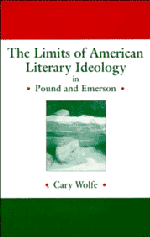Book contents
4 - “Gynocracy” and “Red Blood”: Pound and the Politics of Feminization
Published online by Cambridge University Press: 08 February 2010
Summary
By virtue of his manly rhetoric of virtù, Pound compels us to situate his critique of American culture within an economy of gender as well. As an antidote to the evils of abstraction, conformity, and what a later critical vocabulary would call reification, Pound seems to offer us an exclusively male world of experience, of rough-and-tumble, bone and sinew, which constantly threatens to evaporate into the clichés of macho, rugged individualism. As we shall see, however, Pound's critique is a good deal more complex than that. When he set the virtù of the “entire man” over against what he called the “gynocracy” of genteel writers and editors like Edmund Clarence Stedman, Richard Watson Gilder, and Robert Underwood Johnson, he engaged himself not so much in some misogynist battle of the sexes as in yet another effort in a long line of American endeavors by male writers to move literature from the drawingroom margins it occupied at the turn of the century into the public sphere, where it might be taken seriously as a liberating force for social critique and change.
The rhetoric of gender and feminization in Pound's cultural critique is particularly complex to assess for a whole host of reasons, not the least of which is that in Pound's work the figure of gender – like that of economics – can never be read in isolation or taken, as it were, at face value. It is almost always, and overtly so, articulated in tandem with the other major concerns of class, economics, and cultural production in Pound's ambitious and totalizing critique.
- Type
- Chapter
- Information
- Publisher: Cambridge University PressPrint publication year: 1994

